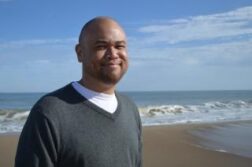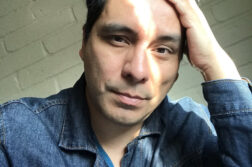TOBY JOHNSON is co-author, with Walter L. Williams, of Two Spirits: A Story of Life with the Navajo (2005), a historical novel that creatively recounts the brutal history of how Union soldiers mistreated the Navajo people in New Mexico just after the Civil War. It turns into a tender love story between the two-spirit “berdache” shaman of the tribe and the protagonist, a young government Indian agent with a conscience. Their passionate relationship allows the white agent to understand the Indians’ plight and seek to redress their mistreatment by the corrupt Union general who’s intent on stealing their land. The plot thickens as the Indian agent discovers that the native American culture honors people like himself—and his new beloved, who blends masculine and feminine characteristics.

At Easton Mountain’s Gay Spirit Camp, which I attended in part to see Toby again after a fifteen year hiatus, the San Antonio native spoke about the evolution of myth and religion to provide gay-specific practices and insights into the meaning of life and the place of gay identity in human societies. Johnson was a student and friend of the renowned comparative religions scholar Joseph Campbell, who is best known for his sage advice: “Follow your bliss.” Johnson, only half jokingly, calls himself “Joe Campbell’s apostle to the gay community,” because he himself found in Campbell’s modern transcendent vision and mythological interpretation of religious meaning a way of reconciling his sexuality with his spirituality. In addition to the keynote address, “Why Gay Spirituality?,” Johnson spoke about the “Ten Roles of Gay Men in Culture” identified by gay spiritual writer Christian de la Huerta and the spirituality of “Joyful Participation in the Sorrows of the World,” combining themes in Christianity and Buddhism.
Toby is a fascinating, and sometimes quite funny, lecturer on this subject. I first met Toby, along with Kip, his life partner for 24 years and counting, when they were running a gay bookstore in Austin in the early 1990’s. I was on assignment for The Guide magazine and stayed with them at their lovely bed and breakfast, which they have since sold, and I got to know Toby and some of his writings. As author of nonfiction books such as Gay Spirituality and Gay Perspective (as well as the award winning gay science fiction thriller Secret Matter) and former editor of White Crane Journal, Johnson is a recognized spokesperson of the gay spirituality movement. One of Johnson’s central ideas is that gay people transcend gender. “We don’t have to be masculine men or feminine women, we can just be ourselves,” he says of straight men’s anxieties about appearing manly. That freedom from gender obsession allows gay men to play with masculine and feminine stereotypes, often in whimsical ways (the origins of “camp”). Johnson observes that this gay perspective potentially gives a freedom from the usual dualistic thinking that so plagues the human species. This is why, he argues, gay people are less likely to fall for the simple dichotomies between right and wrong or good and evil that stir such discord and enmity in society. Gay people are more often the peacemakers, artists, entertainers, and 21st-century mystics. This transcendence of dualistic thinking is one of the major goals of the spiritual and esoteric Christian and Buddhist traditions.
In a presentation of fellow writer Christian de la Huerta’s model of “Ten Roles of Gay People Throughout History,” Toby speaks about how gays were traditionally the healers, the shamans, or the scouts who would go out to assess the danger of a threat to their fellow tribe members, perhaps because they were viewed expendable. Gay men are often the ones who take that first step into the unknown that others cannot or don’t want to see. A recent example would be Mark Bingham, the gay man on Flight 93 on 9/11 who helped organize the doomed passengers to resist the hijackers. Another would be Ellen Richards, the lesbian scientist who helped institute the science of ecology and was instrumental in the passage of the Pure Food and Drug Act. Johnson acknowledges the influence on his thought of Harry Hay, who helped jump-start the modern gay movement and showed how our status as outsiders can be the impetus to separate us from the herd mentality and allow us to incorporate fresh perspectives that make us more inclined toward the spiritual.
Johnson’s central point about gay consciousness is that there’s a major transformation happening in the understanding of religion caused by modernization and the natural evolution of human thought according to which religious imagery is understood, not as absolute “Truths” but as symbolic and metaphorical clues to the nature of mind and consciousness. Furthermore, this higher understanding comes from viewing the world’s religions from outside any particular set of doctrines and myths. This outsider perspective is something at which gay people are naturals. We learn this kind of critical perspective on religion and on culture as part of our coping with our sexual difference. Consequently, gay people are the avant-garde in religion and spirituality, just as we are in the arts and culture; and some gay people, gay men in particular, have a talent for creating religious symbols and myths. This, in Johnson’s view, is how gay people contribute to evolution even though most gays remain childless. The modern gay contribution to religion is to awaken the human race to the nature of consciousness, far beyond the stories of personal gods and afterlife options. And, indeed, our issues are forcing a rethinking of traditional morality and religious dogmas. This transformation is seen most familiarly in the popular, if inexact, distinction between being “religious” and being “spiritual.”





